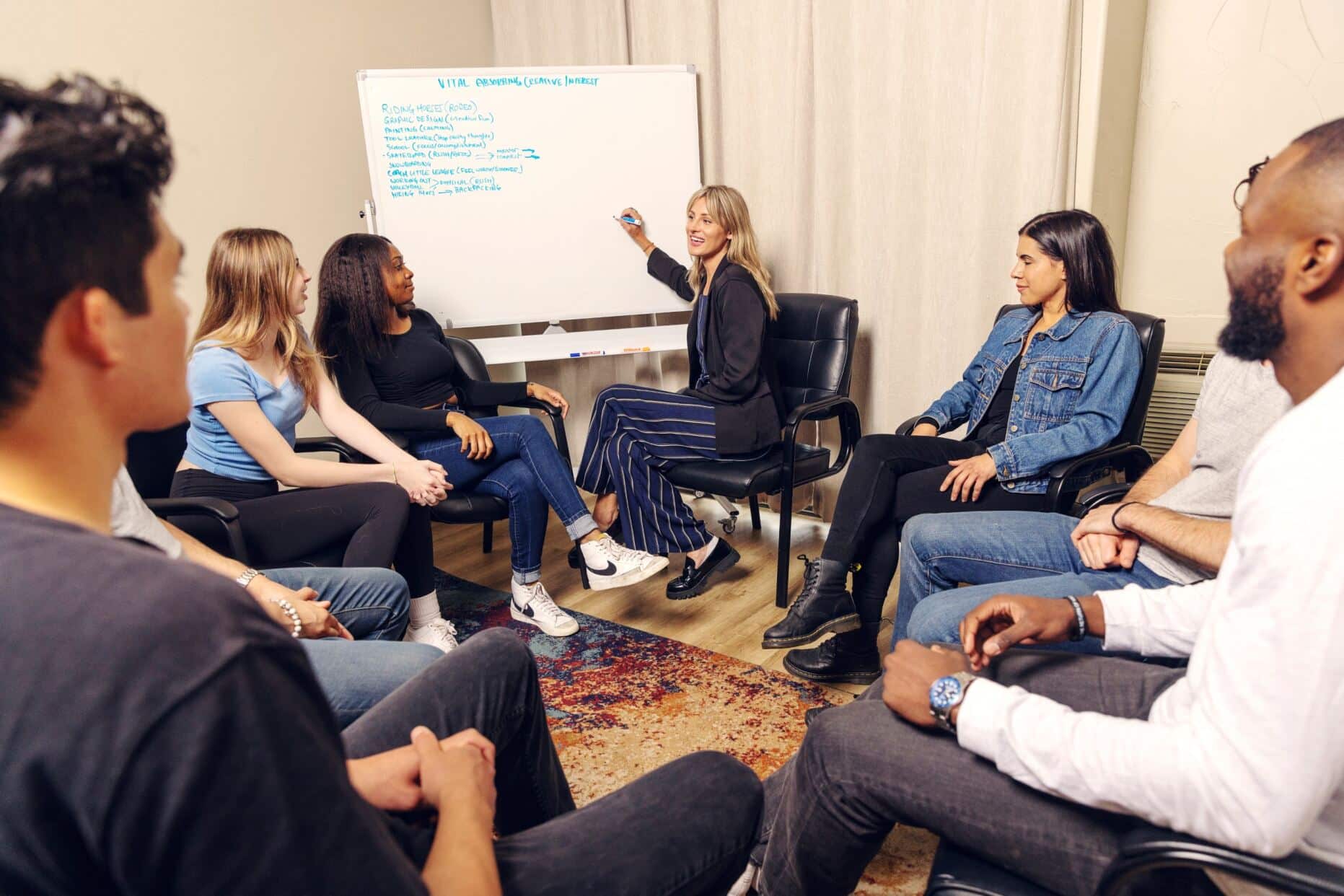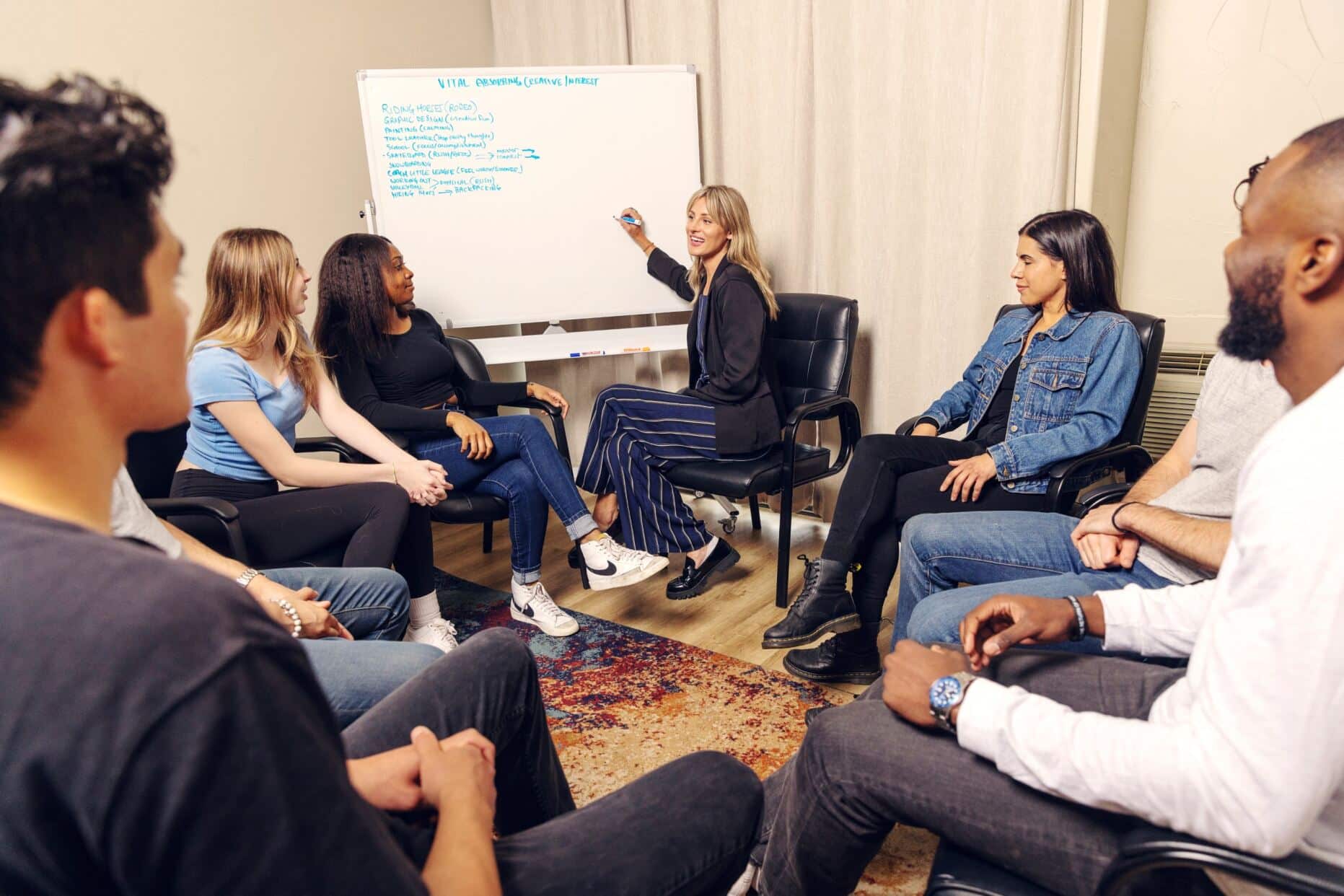Once you complete detox, which normally lasts from seven to 10 days, it’ll be time to enter the program that’s been designed for your needs.
Most of the time, our patients go from detox right over to residential rehab, but your insurance company often plays a part in that decision. They’ll have a team of doctors, addiction treatment experts, and health care professionals who oversee your case. They’ll work with our treatment team to decide what would work best for you.
For many people, residential rehab is the next stage of treatment, but some patients might instead live off-site in a partial hospitalization program (PHP) or intensive outpatient program (IOP).
What Happens in Residential Treatment?
Residential treatment is a critical stage for many who struggle with substance use disorders. Here, you’ll stay at one of our centers, where you’ll be free of the people, places, situations, and environments that you may associate with drug or alcohol abuse. Our goal is to work with you, particularly through group and individual therapies, so you adjust to sobriety and learn not to use these substances again.
It might seem impossible to imagine a future without drugs or alcohol, especially after you get out of rehab and return to some of the people, places, and situations that may remind you of taking substances. With time, focus, and practice, however, lasting sobriety is achievable.
In the meantime, residential rehab shields you from potential distractions and triggers as you adjust to this new (and ultimately healthier) reality.
At our centers, patients can expect a structured schedule with wakeup, medications (when prescribed), meals, classes, support groups, individual therapy, plus some free time for socializing, recreation, and meditation.
One-on-one talk therapy allows you to explore issues that may have contributed to your drug or alcohol abuse. That includes if you have a dual diagnosis (or co-occurring disorder like depression or anxiety) that resulted from or contributed to your addictive behaviors. Learning how to handle matters that send your emotions into overdrive — whether it’s stress, depression, trauma, or feeling stretched too thin — can help you in your recovery. Group therapy reminds you you’re not alone in your struggles. Peers going through similar struggles can provide helpful advice.
Our centers offer several options to let you get active or unwind. You might enjoy working out in one of our fitness rooms or swimming in the pool. We also offer spots for you to socialize, read, meditate, and more.
Our schedules also have activities that help your recovery in more indirect ways.
You might learn to become more confident and build trust through the equine therapy program at Mountain Springs, for example, or express yourself and explore your emotions through art therapy at Willow Springs.
Will I Be Able to Choose My Treatment Program?
When you begin a stay at one of our centers, you’ll have many of the same therapists, counselors, and team members working with you during your stay. That helps us get to know you better, and it can make it possible to get more accomplished.
There are also many different treatment programs to choose from, all with strong track records, to help your recovery:
- 12-step programs: Alcoholics Anonymous (AA) is the best known of this type of program, but there are numerous 12-steps for specific addictions (cocaine, gambling, etc.). These groups offer a sense of community, and attending meetings regularly provides added structure. Many find working the steps to be helpful, and Sunshine Behavioral Health encourages clients to continue with a 12-step (or non-12-step alternative) even after they check out of rehab as a means of reinforcing sobriety.
- Non-12-step: Not everyone is a fan of 12-steps because they tend to be more faith-based — particularly Christian-influenced. Some don’t like that 12-steps ask members to acknowledge a higher power. (It doesn’t have to be God, but simply anything bigger or greater than you — like a mountain or the ocean.) Others feel it’s too church-adjacent for their comfort. That’s where non-12-steps can help. SMART Recovery is one popular option, which focuses more on psychology rather than spirituality.
- Behavioral therapies: There are many types of behavioral therapies, but one of the most common is cognitive-behavioral therapy. CBT helps patients better identify and understand problematic thinking patterns. They also learn to respond to stress, triggers, and other problems, in more productive and healthy ways.
- Holistic rehab treatments. This can include yoga, tai chi, meditation, acupuncture, and massage. Equine therapy, art therapy, and music therapy also fall into the holistic treatment family. The goal is to heal the mind, body, and spirit. That’s accomplished by helping patients stress less, regulate troubling emotions, develop confidence, and more, all to prevent relapse.
- Dual diagnosis assistance. When emotional or mental health conditions are undiagnosed or untreated, some people resort to substance use disorder as a form of self-medication. Sometimes mental or emotional disorders can result from drug or alcohol abuse, too. Clients tend to have better outcomes when both the addiction and the mental or emotional disorders are treated.
- Group therapies. These types of therapies can serve many purposes, including educating patients about mental health and substance use disorder, teaching abstinence skills, and developing healthier communication methods.
Medical disclaimer:
Sunshine Behavioral Health strives to help people who are facing substance abuse, addiction, mental health disorders, or a combination of these conditions. It does this by providing compassionate care and evidence-based content that addresses health, treatment, and recovery.
Licensed medical professionals review material we publish on our site. The material is not a substitute for qualified medical diagnoses, treatment, or advice. It should not be used to replace the suggestions of your personal physician or other health care professionals.







